Why Volos is Perfect in Autumn
The charming port city of Volos...
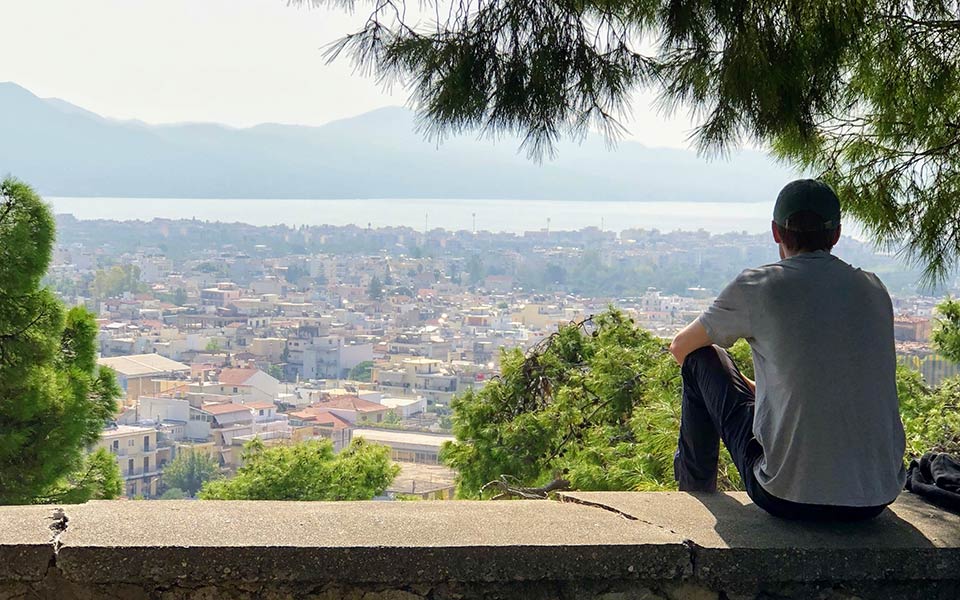
View from the Kastro, or castle, in Kalamata.
© Hayley Prokos
If you’ve heard about the city of Kalamata, we’ll bet it had to do with the larger region’s reputation for producing some of the finest black olives. While olive groves indeed dominate the fields around the city, Kalamata has much more to offer than just a salty snack.
Any visit to this south Peloponnesian city should include an exploration of the center, the coastline and the surrounding countryside to enjoy all the area has to offer. This guide will help you to outline your itinerary.
If it’s a Wednesday or Saturday, stop by Kalamata’s agora (Spartis 31), where you’ll find an impressive selection of seafood, meats, cheese, nuts, legumes, organic produce and, of course, locally grown olives. Particularly if you’re heading to the beach or on an excursion to one of the outer villages, you may want to snag some snacks here.
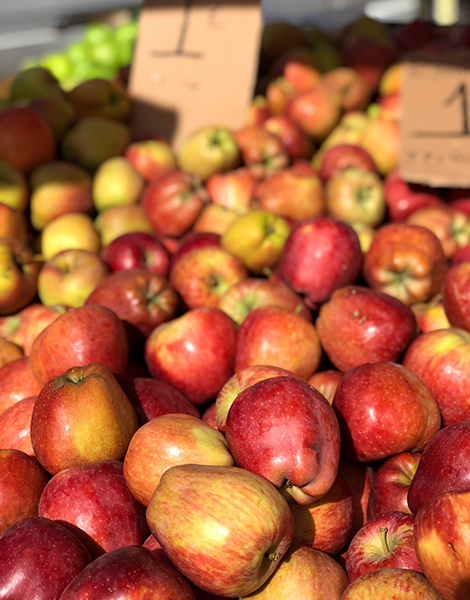
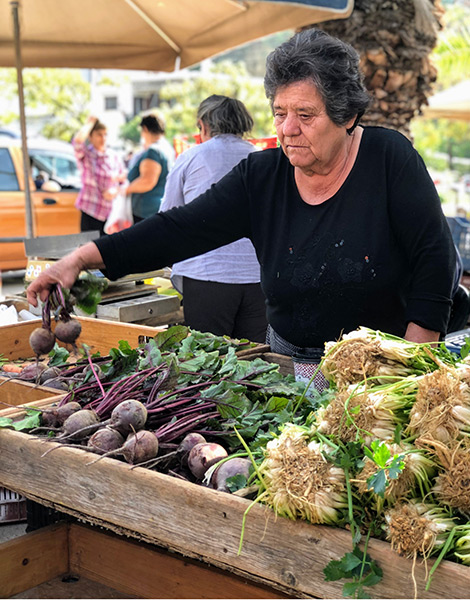
Kalamata Open Market
© Hayley Prokos
In the kentriki plateia, or central square, you’ll find a number cafés and coffee shops, where locals love to mingle over their preferred beverage. Bistroteca (Vasileos Georgiou 18) is a hotspot for such coffee and conversation, though Adelante, Bodega and Platea (a relatively new addition, brought to the square by Greek soccer star/entrepreneur Sokratis Papastathopoulos) have similar offerings and atmospheres.
The Kastro, or castle (Spartis 28), sits just above the agora and overlooks the city. Unlike the fortresses of other Peloponnesian towns such as Monemvasia or Nafplio, the castle of Kalamata isn’t structurally elaborate (historical accounts describe it as a ‘weak’ Byzantine fort). That said, it is a pleasant site for a walk, and it hosts a number of theatrical performances in Greek over the course of the summer that are well worth catching…
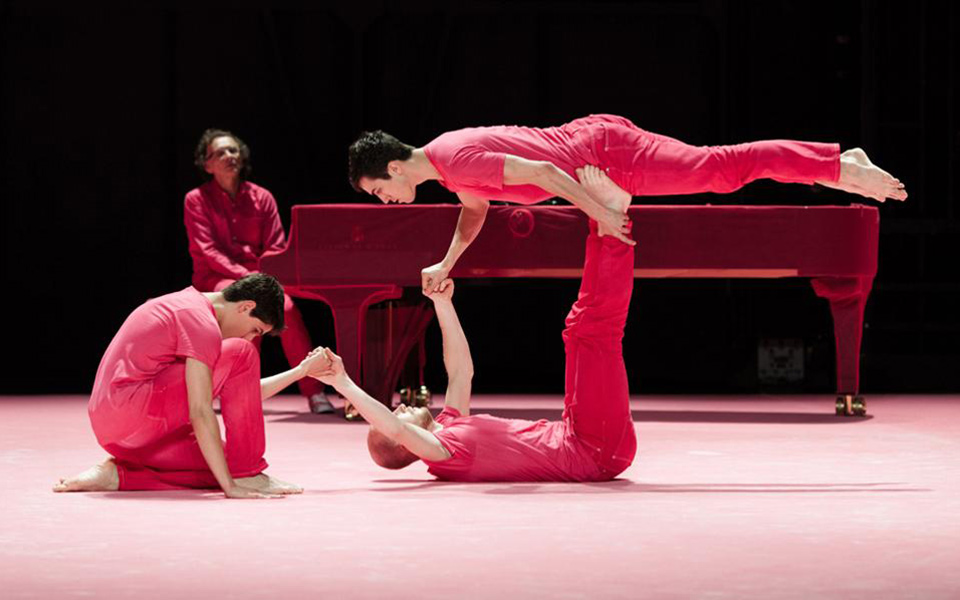
And speaking of shows: If you’re visiting in mid July, check out the internationally-acclaimed Kalamata International Dance Festival, which, for 10 days of the month, hosts a slew of contemporary dance performances and workshops throughout the city. (Last year’s classes included those for professional dancers as well as amateurs, children and people with physical disabilities.)
From the main square, the pedestrian-only road Aristomenous will lead you into the Palia Poli, or historic quarter. As you walk, pay attention to the city’s meticulously restored neoclassical buildings, from the Dimarheio, or City Hall, to the Hotel Rex (Aristomenous 26). Established in 1899, it is one of the oldest hotels in the city.
Within the historic quarter is the Square of March 23, named for the day on which the city’s inhabitants launched an open rebellion against the Ottomans in 1821, sparking the decade-long Greek War of Independence. Once a maze of produce shops and paplomatadika, (carpet shops), the district now hosts a number of modish bars and tavernas that are all centered around the quaint Byzantine Church of the Holy Apostles, a city landmark worth peeking into.
No more than a stone’s throw away from the church, well within the historic quarter, is the Archaeological Museum of Messinia (Agiou Ioannou 3). The museum, which used to be a bazaar for produce vendors, houses a number of antiquities (coins, pottery and other artifacts) from the region. It’s small in relation to the archaeological museums you’d find in other cities, so it makes for a perfect cultural pit stop on your stroll around town.
There’s also the Museum of Traditional Greek Costumes (Stadiou 64), which has garnered much praise from locals and visitors alike since it opened in 2017. The array of costumes, which was largely assembled from the personal collection of prominent Kalamata resident Victoria Karelia, includes layers upon layers of fine hand-embroidered apparel as well as headdresses, jewelry, belts and shoes from many periods.

© Vangelis Zavos
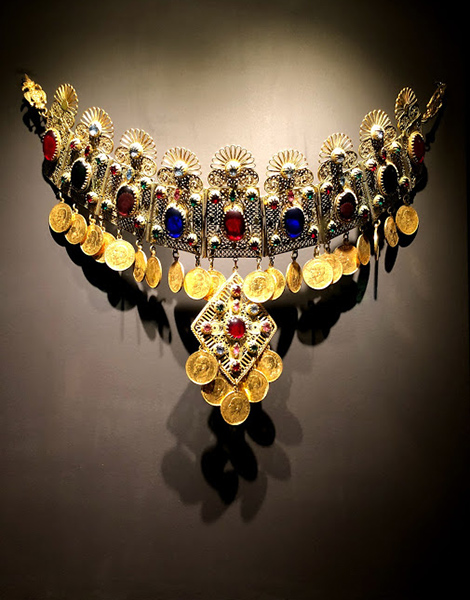
Jewels at the Museum of Traditional Greek Costumes.
© Hayley Prokos
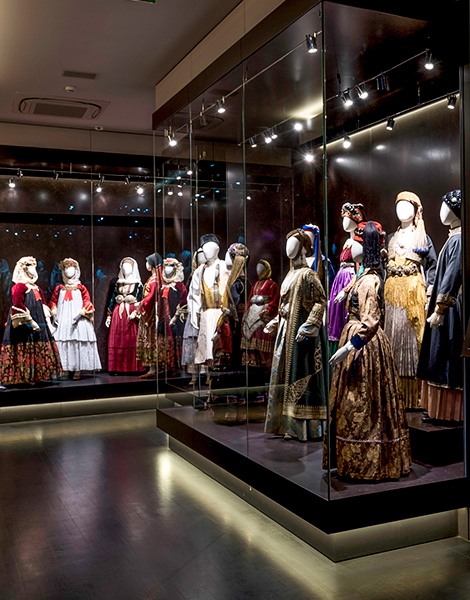
Admire the displays of the authentic costumes, which are preserved in floor-to-ceiling, climate-controlled cases, and the building that houses the museum – a neoclassical structure impeccably restored by architect Thanassis Kyratsou, who has also worked on monuments like the Villa Medici in Rome. Also, enjoy the museum’s high tech features: Many of the mannequins rotate slowly to give spectators a 360-degree view; the displays feature sophisticated lighting against black backdrops; and touch screen tablets offer information on each of the displays.
Residents of Kalamata pride themselves on living in a metropolitan area that’s also by the sea. Walk along the coastline to enjoy a view of the Messinian Bay and its harbor where traditional caiques, skiffs, sailboats and yachts are moored. The promenade is lined with cafeterias and features a playground.
May to October comprises the main season to sunbathe and swim, so you’ll see many people doing just that if you’re visiting during those months. The beaches located just east of the marina are lined with lounge chairs, for which patrons are not – unlike at many other seaside destinations around Greece – required to pay over and above a drink or meal order.
Additionally, if you’re the sporty kind of vacationer, some beaches offer kayak rentals; if you’re more daring, try paragliding from the nearby mountain Kalathi; and if you’re something of a fisherman, you may enjoy fishing all around the bay for tsipoura, kefalos and salpes.
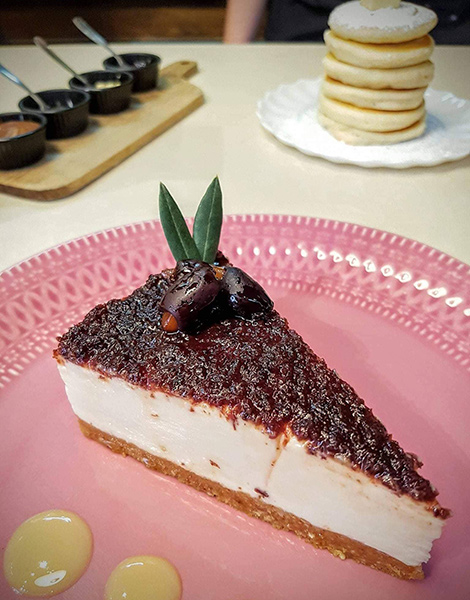
Cheesecake made with local olive jam at Blossom Owl.
© Blossom Owl
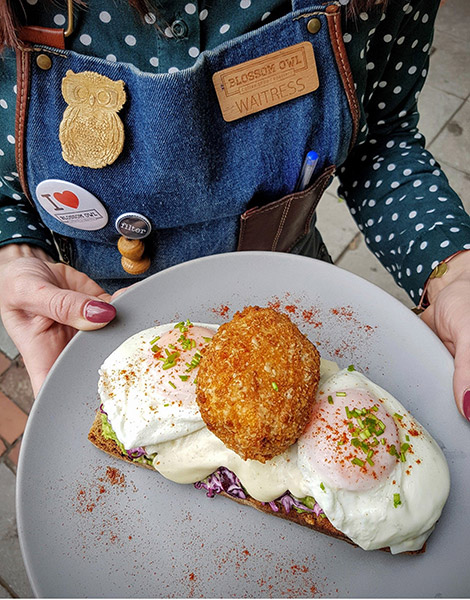
Savory brunch offering at Blossom Owl.
© Blossom Owl
With all of the sightseeing you’ll be doing, we recommend a hearty mid-morning meal to kickstart the day. Café/pastry shop Blossom Owl (Valaoritou 7) has all-day brunch, with decadent and artfully crafted pancake dishes that steal the show – from a spiced chai pancake tower complete with fresh cream, maple syrup and berries to a stack of chocolate ones, stuffed with fresh banana and garnished with cream and macadamia nuts. Savory offerings include a ‘Mac n Cheese’ burger and a scrambled eggs with with graviera cheese, tomato and locally sourced pork.
Another option is Luna Lounge (Aristomenous 23), where locals and tourists alike flock to the café-bar, which sits squarely in the city center and offers an array of coffee beverages and spirits throughout the day. Their fluffy pancakes topped with banoffee, honey or Kinder bueno are popular among the locals, though you can’t go wrong with their open-faced deli sandwich made with Cretan salami and cheeses, or the eggs Benedict with the shop’s house-made hollandaise sauce.
If you’re not a brunch person, Luna Lounge maintains a cool, cosmopolitan vibe for drinks and small bites after 9pm.
Stop in for a pastry at Athanasiou, a chain that has been a fixture in Kalamata for over 20 years – and with good reason. If you’re in the mood to indulge, the shop makes a makes a mean galaktoboureko (custard pie). While they’re best known for their decadent sweet treats, the shop also has a selection of savory ones, from spanakopites (spinach pies) and tiropites (cheese pies) to deli sandwiches made with brioche and whole loaves for takeaway, baked fresh every day. It’s also an ideal place to pick up edible souvenirs, such as dried figs, cookies and jams.
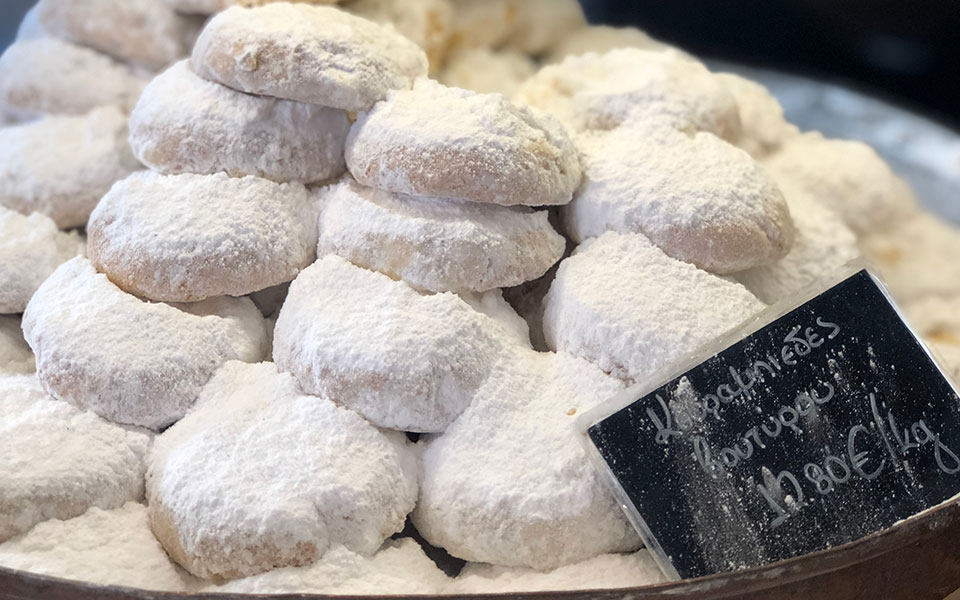
Traditional Greek cookies at Athanasiou.
© Hayley Prokos
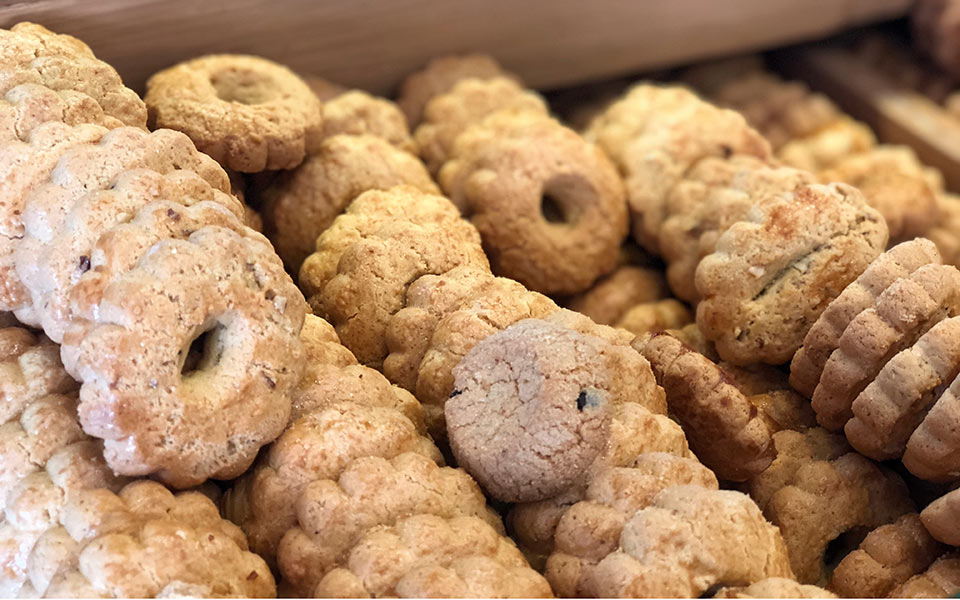
Traditional Greek cookies at Athanasiou.
© Hayley Prokos
For more traditional Messinian treats, head to the zacharoplasteio, or pastry shop, Adelfon Lampou (Vasileos Georgiou 6). The business, established by six siblings in 1950 and now run by their children, offers abundant supplies of Messinian specialties like lalakia (bands of dough fried in olive oil to a light crisp), pasteli (bars of sesame, honey and sometimes peanuts) and handmade diples (a flaky, honey and nut-covered fried pastry, made daily at the shop).
Nestled in the heart of the historic district, you’ll find a great selection of Greek spirits at Kantoina (Ithomis 5), a bistro with decor resembling that of a rustic Greek home. The shop offers approximately 140 exclusively Greek wines – and in that list, a number of ‘natural’ options (i.e., wines without additives or preservatives) – to enjoy there or to take away.
If you’re looking for a good meal – or at the very least, a meze to compliment your vintage – Kantoina also offers a unique dining experience: a selection of 12 à la carte dishes, inspired by the season. Since the menu changes weekly (every Thursday, to be exact), we can’t recommend a specific dish, but you certainly can’t go wrong with a pasta dish as chef Aggeliki Griva makes all of her pasta by hand.
Kardamo (Sidirodromikou Stathmou 21), another fixture of the historic quarter is a great alternative if you’re looking for something upscale and also family-friendly. The restaurant, which opened in 2010, puts a slight yet unexpected spin on traditional dishes. Our favorite example is the fava, or split pea dip garnished with smoked pork and onion jam, which offers just the right mix of sweet and savory in every bite.
Both O Thiasos (Ipapantis 3) and Ta Rolla (Spartis 53) promise unadulterated traditional foods – and great Messinian-style pork dishes in particular. If it’s street food you’re looking for, the fare at Souvlakia O Tzimis’s (Benaki 1) doesn’t disappoint.
Situated a mere 45 minutes north of Kalamata (near the village of Mavromati), the site of Ancient Messene is arguably one of the most underrated sites in Greece, comparable to even much more famous ancient Peloponnesian sites like Olympia, Mycenae and Epidauros.
Upon defeating the Spartans at the Battle of Leuctra in 371 B.C.E., the Thebans, under the leadership of the general Epaminondas, freed the Messinians from over 300 years of Spartan rule. What is today a city of ruins was once the Messinian capital and stronghold. Today, the remnants include a small amphitheater, a sanctuary, a stadium and a mausoleum, among other things.
When autumn rolls around, Greeks all over the country head to the countryside to pick olives. And yet, no region’s are as famous as the olives of Kalamata. (While we did say that the area shouldn’t be known only for its olives, they are actually pretty special.)
About a half an hour from the city center, you’ll find the local olive mills. At Benakopoulos Olive Oil Mill, visitors can take a walking tour of the fields, learn the process of producing olive oil and participate in a tasting. The 2-hour tour costs 19 euros per person.
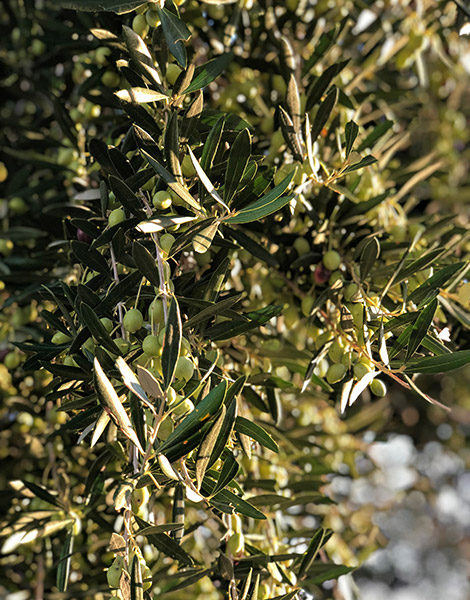
Messinia’s groves, home of the famous Kalamata olive, are the largest in Greece.
© Hayley Prokos
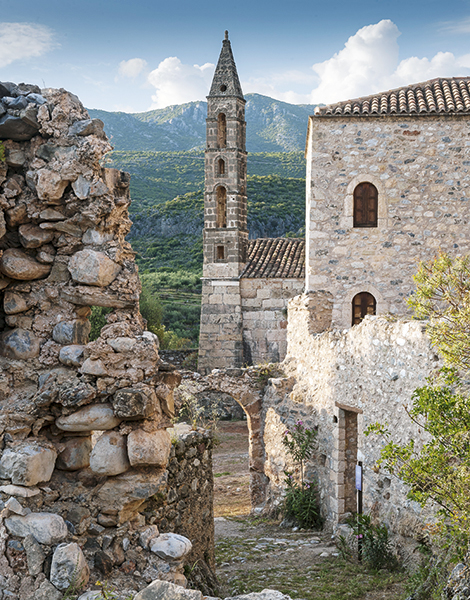
Old Kardamyli
© Olga Charami

The former home of Joan and Patrick Leigh-Fermor in Kardamyli.
© Nikos Kokkas
When you’ve gotten your fill of the hustle and bustle around the city beaches, make a trip through the neighboring seaside villages towards Messinian Mani. If you’re without a car, a bus or a taxi will take you to farthest village on the Bay of Messinia (about a 30-minute drive away from the center on the coastal road), called Kitries. The cost is approximately 3 and 20 euros respectively.
Alternatively, the town of Kardamyli sits about 50 minutes east of Kalamata and is accessible via the mountain road. Locals love the area, which also became the home of British writer Patrick Leigh-Fermor, who became enchanted by its small-town feel and its idyllic landscape of rolling hills, olive groves and cypress trees next to the clear blue waters.
Wherever you decide to go, if it’s summer, bring a suit and some snorkeling gear. Because the bottoms are mainly rocky, the waters remain crystal-clear, allowing you to clearly view fish and sea life, even at great depths in villages and towns like Mikri Mantineia, Kitries and Kardamyli. And of course, plan to stay for lunch.
In Kitries right on the beach, at the family-run Klonaridis Tavern (the owner, Manolis, has roots in the village and took over his father’s taverna a number of years ago), enjoy a glass (or two) of ouzo and a meze such as marinated sardines, or a more generous helping of the catch-of-the-day, on any day of the summer. (Just keep in mind that, from fall to spring, the taverna is generally closed.)
If you’re looking for a bite closer to the heart of the village, also with close proximity to the waterfront, head to Psarotaverna Gaitanaros, to nibble on fresh fish and seafood.
The charming port city of Volos...
Landmark shops, a lively cultural scene...
A historic hotel redefines modern Greek...
The Olympic elite, Hollywood’s finest, the...